Officials Say Iran Behind Attack On US Forces In Syria
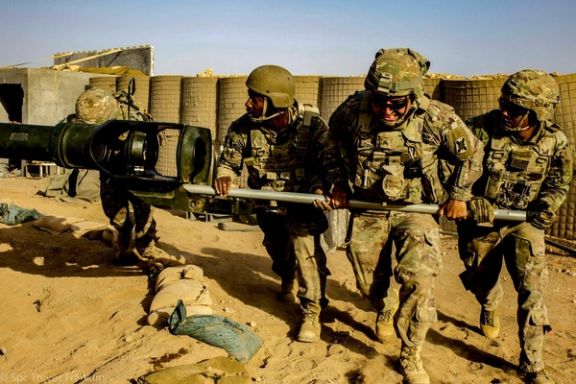
US officials say they believe Iran was behind the drone attack last week at the military outpost in southern Syria where American troops are based.

US officials say they believe Iran was behind the drone attack last week at the military outpost in southern Syria where American troops are based.
Officials said Monday the US believes that Iran resourced and encouraged the attack, but that the drones were not launched from Iran. They were Iranian drones, and Iran appears to have facilitated their use, officials said, speaking on condition of anonymity to discuss details that have not been made public.
Officials said they believe the attacks involved as many as five drones laden with explosive charges, and that they hit both the U.S. side of al-Tanf garrison and the side where Syrian opposition forces stay.
Pentagon spokesman John Kirby declined to provide details when asked about the report during a news conference Monday. He called it a “complex, coordinated and deliberate attack” and said the US has seen similar ones before from Shia militia groups that are backed by Iran. But he would not go into specifics and said he had no update on the munitions used in the attack.
Kirby also declined to say if troops were warned ahead of time or whether the US intends to make a military response.
“The protection and security of our troops overseas remains a paramount concern for the secretary,” Kirby said, referring to Defense Secretary Lloyd Austin, “and that if there is to be a response, it will be at a time and a place and a manner of our choosing, and we certainly won't get ahead of those kinds of decisions.

A top Israeli official has told Iran International that an attack against Iran's nuclear targets has become a priority, as media say that training will begin.
"The Israeli Air Force will begin practicing for a strike on Iran’s nuclear program beginning next year, having set aside funding and updated its training schedule for the mission," the Times of Israel reported. The newspaper said that while plans were in draft, some parts could be ready quickly while others would take over a year to be fully actionable.
A senior Israeli military official told Iran International's correspondent in Tel Aviv Monday that attacking Iran was now the Israeli air force’s top priority. Last week the Israeli media revealed the government had a $1.5-billion budget for an attack on Iran's nuclear facilities that covered fighter jets, bombers, and intelligence gathering drones, as well as specialized munitions that could penetrate Iran's underground sites.
Israel has for decades accused Iran of pursuing a nuclear bomb. Iran has repeatedly declared that it has no intention of attaining atomic weapons and its program has been closely monitored by the International Atomic Energy Agency. An Israeli attack would be the first on nuclear sites under IAEA inspection.
Iran has also repeatedly declared that it has no intention of pursuing nuclear weapons and criticized the International Atomic Energy Agency for allegedly having "double standards" when it comes to Israel's nuclear program and possession of nukes which it neither confirms nor denies.
Some in Iran, and elsewhere, have said the latest Israeli threats are meant to sabotage Iran's talks with world powers in Vienna to revive the 2015 nuclear agreement, the JCPOA (Joint Comprehensive Plant of Action).
"Israel's limited military sabotage in Iran will continue but the regime will not dare to launch a military attack against Iran," foreign relations commentator Hassan Lasjerdi told Iran's Rouydad news website Monday. Israel's recent threats resulted from Iran's expression of willingness to return to the JCPOA, Lasjerdi said.
Yossi Cohen, former head of the Israel intelligence agency Mossad, recently said that Iran “was not even close to acquiring a nuclear weapon” and that Israel needed to look to build on the JCPOA rather than continuing its opposition.
But others think Israel is ready for military action as it sees itself in danger. “I think an Israeli attack on Iran is definitely possible," Sohrab Sobhani, US-based chairman of Caspian Group holdings, told Iran International. Sobhani said authorities in Tehran lacked a “proper understanding” of Israel's position: “Preservation of Israel means everything to Israel and Jews around the world, irrespective of who rules in the United States.”
Ali Shamkhani, Iran’s top security official, Sunday said Sunday Israel should reconsider its spending plans. "Instead of allocating $1.5 billion budget for atrocities against Iran, the Zionist regime should focus on providing tens of thousands of billion dollars funding to repair the damage that is going to be caused by Iran's shocking response,"he tweeted separately in English, Hebrew, and Arabic.
Iran has ballistic missiles capable of reaching Israel as well as allies in Hezbollah and Palestinian groups who have shorter-range missiles. Israel regularly attacks targets in Lebanon and Syria, and Monday Syrian media reported Israeli attacks on facilities reportedly linked to Hezbollah near the Israel-occupied Golan region of Syria.
But besides its powerful air force, Israel also has long-range missiles that can reach Iran, and ultimately its nuclear weapons, if Iran decides to inflict unbearable damage on its cities.
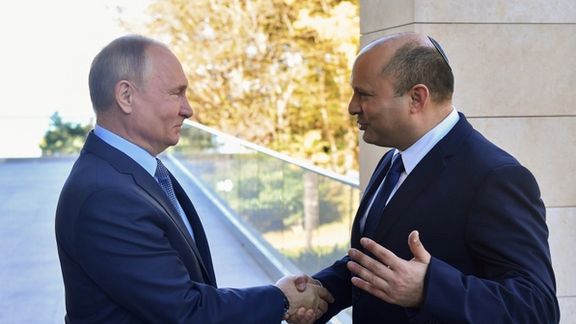
Syrian said Israel attacked targets southern Syria on Monday in a frontier zone where Israel has long been concerned about the presence of Iran-backed groups.
The Israeli military declined to comment.
A Syrian foreign ministry source said Israel had committed "a new aggression in the southern region" at dawn, the Syrian state news agency SANA reported.
Israel has mounted regular strikes against what it has described as Iranian-linked targets in Syria, where Tehran-backed forces including Lebanon's Hezbollah have deployed in support of President Bashar al-Assad during Syria's war.
A pro-Assad source familiar with the incident said an Israeli drone had struck several sites including a base operated by Hezbollah in al Baath city in Quneitra province and a second target. A third missile hit a reconnaissance tower near a Syrian army base, the source said.
The Syrian Observatory for Human Rights, a UK-based organisation which reports on the war, said an Israeli aircraft had fired rockets at two positions held by Syrian government forces and their allies in Quneitra province.
The attack had caused material damage and there was no information yet about casualties, it said.
Syria was discussed last week at a meeting in Sochi between Israeli Prime Minister Naftali Bennett and Russian President Vladimir Putin, Assad's most powerful ally.
Bennett told his cabinet on Sunday the two secured "stable and good" understandings over Syria - an allusion to deconfliction efforts with Russian forces amid continued Israeli air strikes on suspected Iranian assets.
Syria affirmed its right to respond to the attacks, the foreign ministry source quoted by SANA said.

In a rare admission the speaker of Iran’s parliament said Monday, “We could not accomplish anything” with 80 percent of the economy dominated by the government.
In a speech in Mashhad, Mohammad Bagher Ghalibaf, a former top IRGC officer and Tehran mayor, said, “We eliminated people from various areas of public life, or we stratified them”, insisting that without the involvement of large segments of society the Islamic Republic cannot succeed.
Ghalibaf’s remarks come as hardliners loyal to Supreme Leader Ali Khamenei have dominated all three branches of government since February 2020 and have sidelined the loyalist opposition of ‘Reformists’. Ghalibaf himself is accused by former officials and journalists of a role in major corruption schemes in Tehran municipality when he was mayor (2005-2017) and also in suppressing student protests more than two decades ago.
Those who disagreed with the tenants of the Islamic Republic have long been purged by death or exile.
Iran’s economy became dominated by the state after the 1979 revolution when major industries were nationalized in the wake of an Islamic-leftist zeal, and businessman were either jailed, killed or had to flee for their lives.
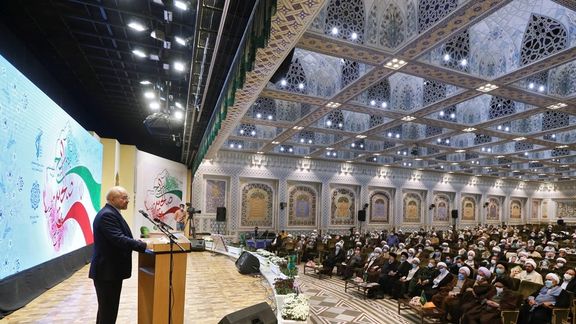
Ghalibaf spoke of alienated youth and asked, “Aren’t these our children…shouldn’t we talk with them?” He also spoke of hardship gripping ordinary workers, saying that they earn less than $200 a month working two jobs and asked, “Shouldn’t we talk about this?”
Anemic economic growth and high inflation that were prevalent since the revolution have become much more acute in the past three years because of United States sanctions. Iran’s currency has dropped almost ninefold since late 2017 and annual inflation is close to 50 percent.
As the situation deteriorates, former and current government officials seem to be competing in advocating for better living conditions for the average Iranian. They also untiringly accuse each other of being responsible for creating the current impasse. Hardliners accuse former President Hassan Rouhani for signing the 2015 nuclear deal, the JCPOA, while reformists argue that without normalization of ties with the rest of the world Iran cannot hope to improve its lot.
Ghalibaf, however, seemed to be taking the rhetoric to a higher level on Monday by saying that without attention to ordinary people even religious beliefs will be eroded. Referring to Shiite sanctities, the speaker of parliament said, “Until when people should show steadfastness for Imam Hussein’s blood?” The grandson of Prophet Muhammed, Hussein, who was killed in 680 AD by other Muslim forces is the saint Shiites uphold as the true heir of the Prophet.
Ghalibaf said, “We were not able to work correctly. We spent more than $20 billion in the past three years to subsidize seven essential imports,” but prices rose for the people. “So, we don’t have a good record in running the country.” He added that open discussion is important because “people are important, and they are the ones to save the religion.”
The speaker who is himself a loyal follower of Khamenei also repeated some of the clerical regime’s favorite themes, such as a “media war” that “enemies” have launched to weaken the Islamic Republic. Another favorite theme he mentioned is a theory advanced by Khamenei that the US created the Islamic State group to weaken Islam.
But Ghalibaf underlined, “When we are in power, we have a responsibility toward everyone, all groups with different views, all religions and ethnic groups, because people live under the umbrella of the Islamic regime, which is in power in the name of religion.”
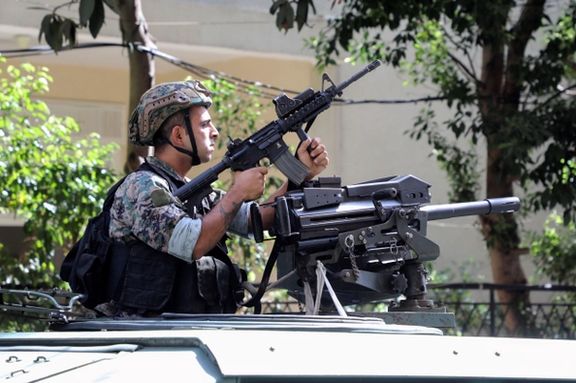
A Lebanese judge on Monday charged 68 people including 18 detainees with murder and incitement to sectarian strife over fatal clashes this month in Beirut.
Seven followers of Lebanon's Shiite Iran-backed Hezbollah group and its ally, the Amal Movement, were killed on Oct. 14 in the worst street violence in Beirut in over a decade.
The gunfire began as protesters assembled for a demonstration called for by Hezbollah and Amal against Judge Tarek Bitar, who is leading an investigation into an explosion at Beirut port that killed over 200 people on Aug. 4 last year.
Monday's charges were filed by Judge Fadi Akiki, a government representative at the military court. They also include charges of attempted murder, possession of unlicensed weapons and destruction of public and private property.
The case was referred to an investigative judge.
Hezbollah has accused the Christian Lebanese Forces party of targeting demonstrators with sniper fire.
The party's leader, Samir Geagea, has denied the allegations and said residents of the Christian-majority Ain al-Remmaneh area, where the violence took place, had acted in self-defense.
In a local television interview last week, Geagea said the trouble began when supporters of the Shi'ite Muslim parties entered the neighborhood and vandalized cars, and that four residents were wounded before a shot was fired.
Footage released later appeared to show at least one person being shot by a soldier.
Report b y Reuters
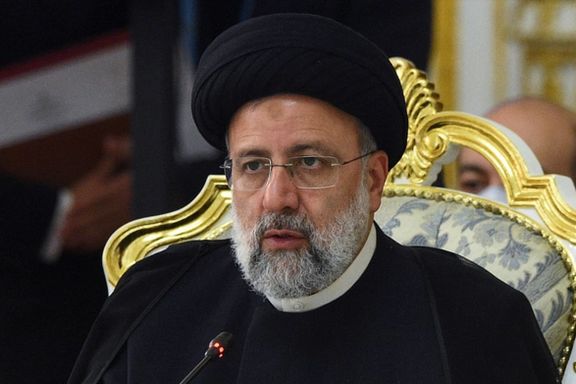
Iran's President Ebrahim Raisi has made enough gaffes in just two months to be advised by a newspaper to seriously consider prevention and damage control.
The reformist paper Etemad Monday in a commentary headlined ‘To Be Read by President’s Advisers,’ lambasted blunders by President Ebrahim Raisi, suggesting they would destroy his self-confidence.
In the past two months Raisi (Raeesi) has uttered several malapropisms and made other errors in his public appearances and speeches, leading to comparisons with United States presidents Donald Trump, Ronald Reagan and George W Bush, whose gaffes and blunders spawned the term 'Bushism' and several books.
Unlike most Iranian clerics such as the 82-year-old Supreme Leader Ali Khamenei who are confident, eloquent public speakers, the 61-year-old cleric now steering Iran's government is clearly no orator. In fact, he often looks quite uneasy when addressing the public.
Raisi made two awkward gaffes last week. In a speech in Ardabil when speaking about the region's cultural heritage, he referred to the Safavid-era Shia scholar, Ahmad ibn Muhammad Ardabili, by two of his titles Mohaghegh (researcher) and Mughaddas (sanctified) as if Mohaghegh Aradabili and Mughaddas Ardabili were two separate characters.
"In our time we neither understood Mohaghegh Aradabili, nor Mughaddas Ardabili," Raisi said.
As a senior cleric who has studied Shia theology and jurisprudence in seminaries for many years this came as a surprise to many even his supporters who are hard at work on social media to whitewash the mistake.
In a speech at the International Islamic Unity Conference, also last week, Raisi referred to the Turkish-born Sunni Muslim scholar Mohammed Said Ramadan al-Bouti − killed in the Syrian war in 2013 and known as "Shaykh of the Levant" − as Shaykh Touti. This was particularly amusing for Iranian social-media users given 'touti' translates as 'parrot'.
Critics have pointed out that Raisi is even not comfortable reading prepared speeches. He read his address to the Shanghai Cooperation Organization (SCO) summit in Tajikistan in September from a prepared text but repeatedly failed to follow the words and mispronounced them so in his speech "belt road" turned into "belt and road" – referring to China’s massive international infrastructural plan – mixed with some other mispronounced words when speaking about a transit project.
The Etemad commentary wrote that Raisi's gaffs would embarrass Iran and that the presidential staff needed to follow the example of White House chief of staff Michael Deaver and presidential adviser David Gergen during the Reagan presidency.
"Gaffes lead to more gaffes,” Etemad observed. “A politician will gradually lose his self-confidence if he makes repeated gaffes and will make even more.” The paper drew a comparison with a volleyball game going badly when the coach "should take a time out" and stop further losses by talking to players.